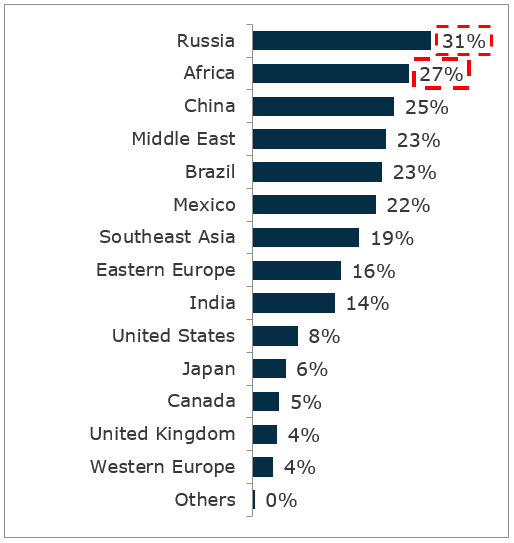Corruption risk is alive and well in China and Latin America and growing in Russia, Africa and Middle East – AlixPartners survey
International regulatory cooperation is making an impact
NEW YORK (August 09, 2018) – AlixPartners, the global consulting firm, today released its 6th annual global anticorruption survey which focuses on the challenges faced by global businesses when managing corruption risks. The survey shows that 85% of survey respondents say their industries are exposed to corruption risk, with 66% of respondents saying they believe there are locations where it is impossible to avoid corrupt business practices. However, prosecution of individuals and cross-border regulatory cooperation are on the rise.
The AlixPartners Global Anticorruption Survey polled corporate counsel, legal, and compliance officers at companies based in the US, Europe and Asia in more than 20 major industries.
Heightened risk in Latin America and China + emerging regions
The perceived corruption risks are elevated in Latin America and China, and Russia, Africa and the Middle East have emerged as regions of increasing concern. The survey found that 90% and 94% of companies with operations in Latin America and China, respectively, reported their industries are exposed to corruption risk, and 38% and 41% of companies with operations in Latin America and China, respectively, believe their company has lost business in the last year due to a situation involving illicit payments to a government official. US enforcement agencies appear to have shifted their focus back to Latin America in 2017, and Russia, Africa and the Middle East are emerging as areas of elevated concern.
Of the 66% of respondents who said there are regions where it is impossible to avoid corrupt business practices, 31% said Russia is one such place and 27% cited Africa. Survey respondents reporting that the Middle East has “significant” corruption risk increased 11% year-over-year to 56% in 2018. 71% and 70% of companies with operations in Russia and Africa, respectively, reported that corruption laws are largely ineffective.
Where respondents said they believe it is impossible to do business without corruption

International cooperation
Cross-border regulatory action is increasing, as governments share information and work together to conduct investigations and levy harsher penalties. Of the eight corporate FCPA enforcement actions brought by US agencies so far in 2018, two involved such international cooperation or a global enforcement action involving cross-jurisdictional enforcement agencies. This is on track to increase in 2018. In Brazil, for example, enforcement agencies have demonstrated their willingness to globally enforce anticorruption initiatives, with five of the nine global enforcement actions since 2016 involving Brazilian agencies.
Individual Actions
A continuing trend from last year’s survey, US enforcement is increasing its focus on prosecuting individuals. Thus far in 2018, the SEC and Department of Justice have brought charges against at least 15 individuals, already more than half of the total charges against individuals in 2017. Globally, politicians are being increasingly targeted for prosecution in corruption and graft, as tolerance for political corruption has shifted in many countries. For example, of companies with operations In Latin America and China, 38% and 41%, respectively, believe their company has lost business in the last year due to a situation involving illicit payments to a government official.
Data and due diligence challenges
The sheer volume of information companies must collect and analyze is the biggest obstacle to tackling corruption, according to 75% of survey respondents. These concerns surrounding management of data are expected to increase with increasing data privacy regulation such as the European Union’s General Data Protection Regulation. 88% of respondents expect challenges associated with moving data across country borders will increase or stay the same in next 12 months.
Despite the importance of performing due diligence on third parties, our survey and analysis indicate these risks may not be effectively mitigated. In 2017 and 2018, 20 of the 22 enforcement actions taken by the US under the Foreign Corrupt Practices Act involved improper use of a third party or other agent, according to our analysis. Only 39% of respondents said they “continually” or “always” conduct due diligence on third-party agents and consultants. 81% of companies that do business in Latin America and 81% of companies that do business in China said due diligence on third parties is the biggest challenge for compliance programs.
Factors contributing to limitations in due diligence procedures

About the 2018 AlixPartners Global Anticorruption Survey
The AlixPartners Global Anticorruption Survey was conducted in February 2018. The survey polled corporate counsel, legal, and compliance officers about their companies’ anticorruption efforts, compliance policies and ways of identifying and mitigating risk. The survey group consisted of companies based in the United States, Europe and Asia with annual revenues of $150 million or more in more than 20 major industries. For more information about the survey, please visit here.
About AlixPartners
AlixPartners is a results-driven global consulting firm that specializes in helping businesses successfully address their most complex and critical challenges. Our clients include companies, corporate boards, law firms, investment banks, private equity firms, and others. Founded in 1981, AlixPartners is headquartered in New York, and has offices in more than 20 cities around the world. For more information, visit www.alixpartners.com.